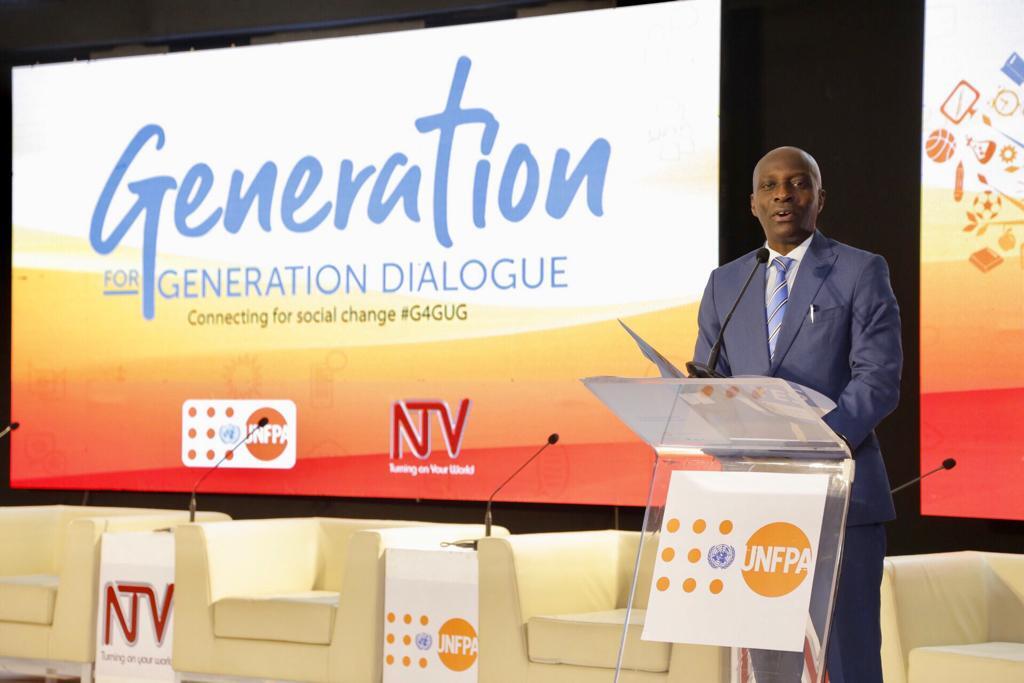The energy and excitement was palpable as over 150 participants from the diplomatic community, civil society, academia, private sector, as well as young people gathered at the Serena Conference Centre in Kampala to take part in UNFPA Uganda’s first Generation for Generation dialogue. A component of UNFPA’s Live your Dream campaign, the Generation for Generation approach is about bringing together generations; the young, middle aged and elderly as well as the academia and decision-makers to engage in conversations aimed at generating policy recommendations on socio-economic issues.
A key note address by Dr. Joseph Muvawala, the Executive Director of the National Planning Authority as well as contributions from a panel reflecting diversity in age, gender and experience set the stage for what was to be an engaging and inspirational discussion. The dialogue, held in partnership with NTV Uganda, was also broadcast live to an audience of over one million under the theme “Is our young population driving Uganda’s socio-economic transformation?”

Delivering the Keynote address, the Executive Director of the National Planning Authority Dr. Joseph Muvawala noted that Uganda’s young population offers an opportunity to drive development if investments are made in their wellbeing. “If we don’t invest in the youth who are the majority of our population we don’t have innovation, we don’t have invention we don’t have economic growth,” he said. “You hold the key to transformation because your generation is more informed, so your transformational power is greater than that of the generation before you. Given your innovativeness and creative power, there is no greater better change agent than the youth,” Dr. Muvawala addressed the young people in attendance.
He emphasized the need to strike a balance between investing in young people and the need for young people themselves to be responsible and make the right choices.
The panelists, Ian Lumonya a student at Uganda Christian University Mukono; Gideon Badagawa of the Private Sector Foundation Uganda; Zilla Mary Arach the founder of Ariokon technologies; Stella Abola from Stanbic Bank; Dr Jotham Musinguzi Executive Director National Population Council and Dr. Maggie Kigozi a business consultant made the case for greater participation of young people in defining their future. They called for review of the education curriculum to better prepare young people to join the job market and creation of a favourable environment to support youth entrepreneurship. In addition, the panelists— in agreement with the key note speaker— emphasised the need for attitudinal and mindset shift among young people to enable them develop resilience and overcome negative attitudes such as the ‘get- rich- quick” and entitlement mentality. They also called for changes in the training curricula of tertiary institutions to enable young people develop soft skills such as problem solving, critical thinking, teamwork and emotional intelligence in addition to technical qualifications.
This thread was also reflected in the contributions from the audience: Evelyn Zalwango, a carpenter and business woman said: “The biggest problem we face is the young people that come to us they have no idea what they are doing. How do we address this challenge? We cannot start saying the government is doing wrong or blame somebody. Everybody has a role to play.”

the dialogue
UNFPA Representative Mr. Alain Sibenaler highlighted the importance of policy implementation. “It is not a matter of having quality policies. It is a matter of being held accountable to make sure that the policies are bringing about rights- based information and equality. At UNFPA we believe that social change is about the link between the policy makers upstream and the day to day realities of everyone who is grappling with making a livelihood,” he said.
The State minister for Youth and Children Affairs Florence Nakiwala Kiyingi appreciated UNFPA and NTV’s partnership that brought the Generation for Generation dialogue to life. “I welcome this initiative that brings together the energy, creative ideas and vitality of young people at the same table with the experience, wisdom and guidance of elders and other distinguished members of society. This mix of skill, experience and knowledge is an important way to generate ideas on how best we can invest in our youthful population,” she said.
She committed to ensure that the policy recommendations are followed up and implemented.
By Martha Songa


